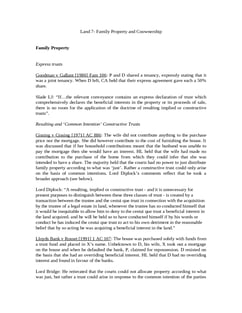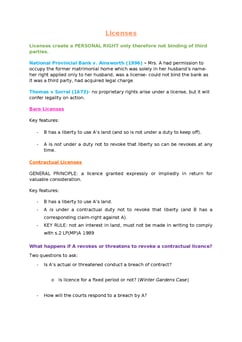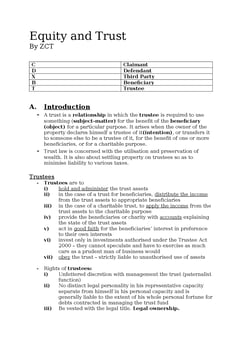Hodgson v Marks [1971] 1 Ch 892
Judgement for the case Hodgson v Marks
Table Of Contents
KEY POINTS
Land Registration Act 1925 recognizes the concept of "actual occupation" as an overriding interest in land registration. When the beneficial owner of a property lives on the land with the vendor, they are considered to be in "actual occupation" under the Land Registration Act 1925. This act is a legal framework that governs various aspects of property law, including trusts and land transactions.
The land-related trust may be created through oral agreements, and such transfers are typically voluntary, without the intention of making a gift. In cases where an express oral trust fails to materialize, the resulting trust is a legal concept that comes into play.
FACTS
In June 1960, the plaintiff, who had owned her residence since 1939, voluntarily transferred the house to E, her lodger. Although E was registered as the house's proprietor, there was an oral agreement that the beneficial ownership would remain with the plaintiff. The plaintiff and E continued to live in the house, with the plaintiff as the owner and E as the lodger.
In 1964, E sold the house to the first defendant, who subsequently executed a charge on the property in favor of a building society, the second defendant. The first defendant was registered as the owner of the house subject to the charge.
In 1965, when both the plaintiff and the first defendant became aware of each other's claims to the property, the plaintiff initiated legal proceedings, seeking a declaration that the first defendant was obligated to transfer the house to her without the charge.
On June 16, 1970, Ungoed-Thomas J. dismissed the plaintiff's legal action. The plaintiff subsequently appealed the decision.
JUDGEMENT
-
The appeal was allowed, and the judgment read as follows:
It was determined that the rights of a person in occupation of land were not overridden when the vendor was or appeared to be, in occupation. Therefore, as the plaintiff had resided in the house as her own, she was considered a person in actual occupation for section 70(1)(g) of the Land Registration Act 1925.
The evidence that the transfer to E was not intended as a gift could not be excluded by section 53(1) of the Law of Property Act 1925. Consequently, if the express trust in favor of the plaintiff failed due to the operation of section 53(1), a resulting trust of the beneficial interest in the plaintiff arose, unaffected by that section.
The plaintiff's "overriding interest" under section 70(1)(g) was deemed absolute, and she was not prevented from asserting it against the defendants, either by estoppel or by a postponement of her beneficial interest to theirs.
In unanimous agreement, if an attempted express trust failed, it provided an appropriate circumstance for the implication of a resulting trust, whether the failure was due to uncertainty, perpetuity, or a lack of form.
The decision of Ungoed-Thomas J. was reversed.
COMMENTARY
The case emphasizes the importance of "actual occupation" as an overriding interest in land registration under the Land Registration Act 1925. When the beneficial owner resides on the property, they are considered in "actual occupation."
Oral agreements can establish land-related trusts, even without the intent of a gift. If an express oral trust fails, a resulting trust protects beneficial interests.
In the case, the plaintiff's ownership of the house was recognized despite registration under her lodger's name. The transfer to the lodger was not seen as a gift, establishing a resulting trust. The plaintiff's "overriding interest" was absolute and not affected by estoppel or postponement.
The unanimous decision clarified that failed express trusts lead to resulting trusts, regardless of the cause. Ungoed-Thomas J.'s decision was overturned, offering clarity on property ownership and trusts.
ORIGINAL ANALYSIS
Hodgson was convinced by E, her lodger, to sign the house over to him on the supposed grounds that it would prevent Hodgson’s nephew from turning him out. She did so, and E, masquerading as full owner, sold to Marks. CA held that Hodgson had beneficial ownership under a resulting trust (since she had paid for the house and there could be no express trust as this would be void by virtue of s.53(1), unlike a resulting trust which is exempt by virtue of s.53(2)).
Since she was in actual occupation and Marks had failed to make reasonable enquiry, Hodgson retained her beneficial ownership.
Russell LJ
If an attempted express trust fails, that seems to me just the occasion for implication of a resulting trust, whether the failure be due to uncertainty, or perpetuity, or lack of form.
----
Using a PIRT is somewhat better than CT because the rules of the former allow it to be applied in this kind of situation and it doesn’t undermine s.53 LPA too much since the presumption can and will be rebutted in cases of genuine intent to make a gift.
It also helps avoid the suggestion that the courts are moving towards the use of a remedial CT.
For Further Study on Hodgson v Marks
Need instant answers? Our AI exam tutor is here to help.
Ask questions 🙋 Get answers 📔 It's simple 👁️👄👁️
Our AI is educated by the highest scoring students across all subjects and schools. Join hundreds of your peers today.
Get StartedSimilar Cases
Related Product Samples
These product samples contain the same concepts we cover in this case.
| Land Law | Registration Theory Notes (39 pages) |
| Property Law | Registration And Acquisition Of Legal Estates Notes (15 pages) |
| Land Law | Trusts Of Land Notes (11 pages) |



